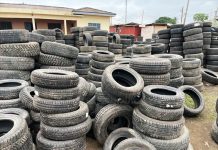The former Vice Chancellor of the University of Ghana, Prof Ebenezer Oduro Owusu, has warned Ghanaians of the probability of importing food and water if we do not take steps to deal with the galamsey (illegal mining) menace in the country.
Speaking at the 75th Anniversary Lecture and 2022 Cocoa Day media launch of the Ghana Cocoa Board (Cocobod) in Accra yesterday, the former Vice Chancellor said the exploitation of gold and other minerals had robbed the country off its fertile and arable lands meant for the production of cocoa and other food crops.
He also indicated that the country was short of clean and unpolluted water due to galamsey activities, and bemoaned the danger of food and water shortage that was looming ahead of the country if it does not lend its unflinching support to the President, Nana Addo Dankwa Akufo-Addo, in fighting the menace.
“If we are not careful, we will soon lose all arable agricultural lands, and make the nation over-dependent on food imports to sustain our food security concerns.
“If we decide to continue behaving the way we are doing, have no doubt that very soon large volumes of water will have to be imported for agricultural and domestic use… How I wished that we would have given the President the fullest support to put an end to the galamsey issues that are bedeviling the nation currently.”
Explaining why he was being sentimental about the seeming failure of the country’s fight against galamsey, Prof Oduro indicated that despite the underdevelopment of the industry today, many people had benefitted from it.
He indicated that there was rapid secondary education in the cocoa growing communities due to the initiation of the ‘Trust Schools’, saying this support by the cocoa industry benefitted especially the University of Ghana, because it led to the establishment of the Akufo Hall.
He also noted that the establishment of the Cocoa Scholarship Scheme by Cocobod saw many leaders of today attend secondary school and furthering their education oversees.
He again spoke about the financial and economic gains the country had benefitted as a result of cocoa, and wondered why Ghanaians were not coming together to fight the menace.
“Personally, I find it difficult to understand why, as a nation, we cannot be united to fight ‘evils’ that threaten the future of our dear country,” Prof Oduro bemoaned.
He urged the citizens to begin the logical drive to reclaim degraded lands for future agricultural use and for cocoa production, so that “our health and wealth will naturally be taken care of.”
Mr. Peter Mac Manu, who chaired the occasion, also indicated that the havoc being caused by galamsey was a pandemic the country had to deal with.
He said stakeholders should leave the sector in a better condition than they inherited by finding a workable solution to deal with galamsey.
The Minister for Food and Agriculture, Mr. Owusu Afriyie Akoto, who had a speech read on his behalf, said most of the industry players had, over the years, done their best to sustain the growth of the industry, and that was why the government was also not relenting in its effort to continue the good works.
He said the government would protect the cocoa economy by securing the best practices that would boost cocoa production and promote the welfare of the farmer.
The Chief Executive Officer of Cocobod, Mr. Joseph Boahen Aidoo, who focused his presentation on the well being of the farmers in the cocoa industry, expressed his appreciation to the gallant Ghanaian cocoa farmers for their continued efforts at sustaining the cocoa industry.
He said the significant strides made over the years would not have been possible if not for the cocoa farmers.
He indicated that in order not to render the services of these farmers useless, Ghanaians must consume the cocoa produced in the country, as well as take pragmatics steps to move the industry forward, by investing in it and ensuring that more value was added to the raw cocoa beans.
National Cocoa Day
The celebration is an annual event, organised to recognise the efforts of hardworking cocoa farmers, create awareness on the health and social benefits of cocoa, and encourage the citizenry to make the consumption of cocoa products part of their daily lives.
This year’s celebration, which will take place at Suhum in the Eastern Region from September 28 – October 1, will be held on the theme: “Cocobod at 75: Sustaining our environment, wealth and health.”
A series of activities, including health walks, exhibition of agro inputs, forum on sustainable production, and quiz competition among some selected senior high schools have all been put in place to make the celebration a memorable one.









